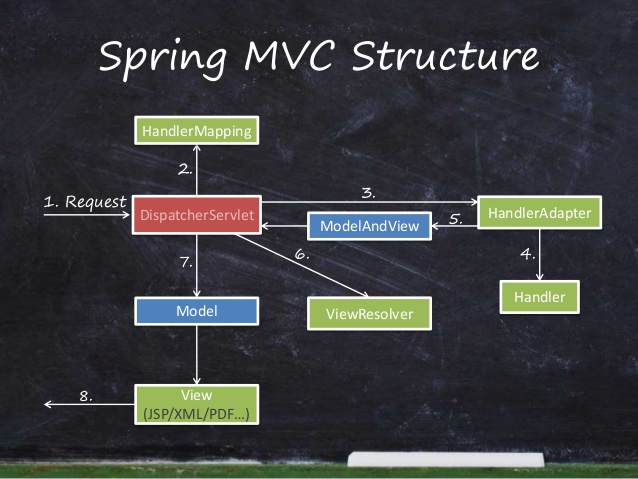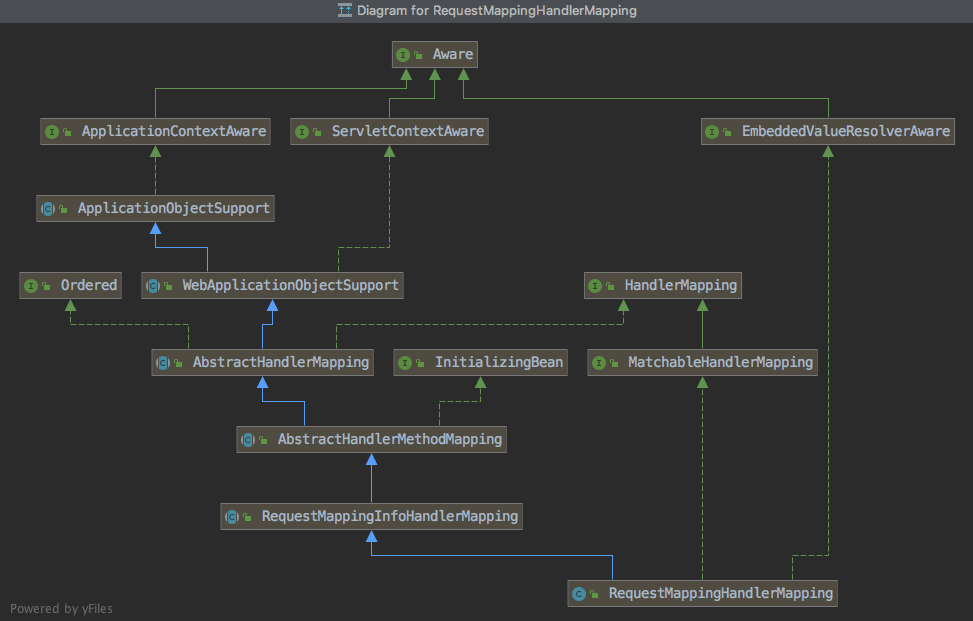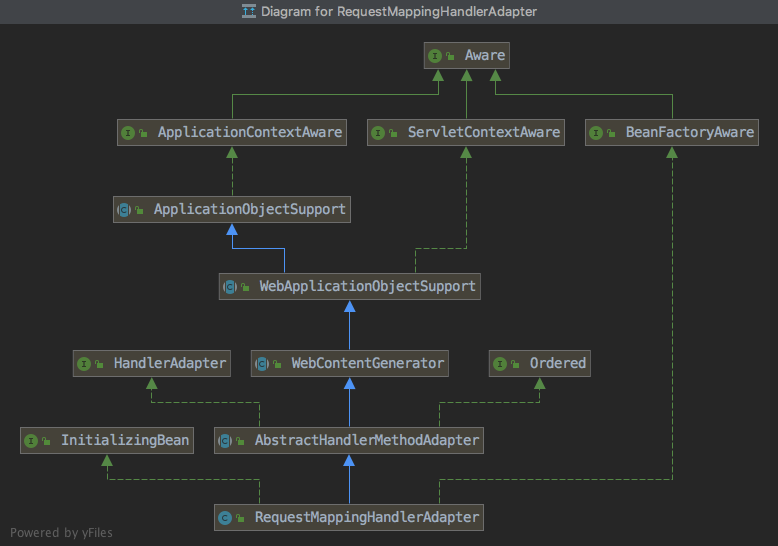需求
假设能够获得到一个 HttpServletRequest,需要根据这个请求内的具体信息,找到其所对应的 Spring Controller 中的方法,并对方法进行调用,获得该方法的返回值。
分析
这个需求,与 DispatcherServlet 的作用非常类似。先看一下请求到达 DispatcherServlet 之后的处理流程:

因为最终目标是获得请求对应的 Controller 方法的返回值,所以上图中的流程走到第 4 步即可。
- HttpServletRequest 请求抵达 DispatcherServlet
- 通过 HandlerMapping 将请求映射到处理器(Handler)和拦截器
- 通过 Handler 找到对应的 HandlerAdapter
- 通过 HandlerAdapter 调用处理器
以 Spring Framework v5.2.2.RELEASE 版本为例,
看看 DispatcherServlet 实现上述功能的过程:
HttpServletRequest 请求抵达 DispatcherServlet
HttpServletRequest 被 Servlet 容器和 Spring Framework 送至 org.springframework.web.servlet.DispatcherServlet#doService,之后委托 org.springframework.web.servlet.DispatcherServlet#doDispatch 执行真正的请求分发。
通过 HandlerMapping 将请求映射到处理器(Handler)和拦截器
在 doDispatch 中,调用 getHandler 方法,根据 HttpServletRequest 获得 HandlerExecutionChain。
DispatcherServlet.java#L1224-L1241
/**
* Return the HandlerExecutionChain for this request.
* <p>Tries all handler mappings in order.
* @param request current HTTP request
* @return the HandlerExecutionChain, or {@code null} if no handler could be found
*/
@Nullable
protected HandlerExecutionChain getHandler(HttpServletRequest request) throws Exception {
if (this.handlerMappings != null) {
for (HandlerMapping mapping : this.handlerMappings) {
HandlerExecutionChain handler = mapping.getHandler(request);
if (handler != null) {
return handler;
}
}
}
return null;
}该方法中,遍历在该类上初始化好的所有 HandlerMapping,HandlerMapping 接口中定义的唯一一个方法,与上述方法签名相同。
@Nullable
HandlerExecutionChain getHandler(HttpServletRequest request) throws Exception;HandlerExecutionChain 是一个包含一个处理器(Handler)和一个拦截器(HandlerInterceptor)集合的结构体,其中的 Handler 就是我们需要的 Controller。
通过 Handler 找到对应的 HandlerAdapter
从 HandlerExecutionChain 中获得到 handler 之后,可以根据 handler 找到对应的适配器(HandlerAdapter)。
DispatcherServlet.java#L1262-L1277
/**
* Return the HandlerAdapter for this handler object.
* @param handler the handler object to find an adapter for
* @throws ServletException if no HandlerAdapter can be found for the handler. This is a fatal error.
*/
protected HandlerAdapter getHandlerAdapter(Object handler) throws ServletException {
if (this.handlerAdapters != null) {
for (HandlerAdapter adapter : this.handlerAdapters) {
if (adapter.supports(handler)) {
return adapter;
}
}
}
throw new ServletException("No adapter for handler [" + handler +
"]: The DispatcherServlet configuration needs to include a HandlerAdapter that supports this handler");
}HandlerAdapter 接口定义了三个方法:
boolean supports(Object handler);
@Nullable
ModelAndView handle(HttpServletRequest request, HttpServletResponse response, Object handler) throws Exception;
long getLastModified(HttpServletRequest request, Object handler);通过 HandlerAdapter 调用处理器
可以看到 handle 方法的返回值类型是 ModelAndView,即此方法完成了上图中的 4、5 两步。而我们的需求中只需要根据请求找到并调用 Controller 对应的方法,并获得该方法的返回值。
Spring 为其 Controller 提供了 HandlerMapping 和 HandlerAdapter 接口的对应实现:RequestMappingHandlerMapping 和 RequestMappingHandlerAdapter。
RequestMappingHandlerMapping

抽象类 AbstractHandlerMapping 在实现 HanlderMapping 接口的 getHandler 方法时,将获得具体 handler 的方法委托给了抽象方法 getHandlerInternal。
AbstractHandlerMapping.java#L441-L442
@Nullable
protected abstract Object getHandlerInternal(HttpServletRequest request) throws Exception;继承了这个抽象类的 AbstractHandlerMethodMapping 将 getHandlerInternal 方法的返回值类型具体化为了 HandlerMethod。
AbstractHandlerMethodMapping.java#L358-L373
/**
* Look up a handler method for the given request.
*/
@Override
protected HandlerMethod getHandlerInternal(HttpServletRequest request) throws Exception {
String lookupPath = getUrlPathHelper().getLookupPathForRequest(request);
request.setAttribute(LOOKUP_PATH, lookupPath);
this.mappingRegistry.acquireReadLock();
try {
HandlerMethod handlerMethod = lookupHandlerMethod(lookupPath, request);
return (handlerMethod != null ? handlerMethod.createWithResolvedBean() : null);
}
finally {
this.mappingRegistry.releaseReadLock();
}
}HandlerMethod 将 handler 的 method 信息进行了封装,可以方便的获得 method,bean,入参及返回值类型信息,以及注解等信息。
RequestMappingHandlerAdapter

在 RequestMappingHandlerAdapter 继承的 AbstractHandlerMethodAdapter 中,实现了 HandlerAdapter 中的 handler 方法,将 handler 具体化为 HandlerMethod 类型,并交由 handlerInternal 抽象方法进行实现。
AbstractHandlerMethodAdapter.java#L79-L88
/**
* This implementation expects the handler to be an {@link HandlerMethod}.
*/
@Override
@Nullable
public final ModelAndView handle(HttpServletRequest request, HttpServletResponse response, Object handler)
throws Exception {
return handleInternal(request, response, (HandlerMethod) handler);
}RequestMappingHandlerAdapter 的 handleInternal 方法通过 invokeHandlerMethod 来调用 handler,并将结果封装为 ModelAndView 返回。
终于刨到根了!
invokeHandlerMethod
先来看下方法签名:
/**
* Invoke the {@link RequestMapping} handler method preparing a {@link ModelAndView}
* if view resolution is required.
* @since 4.2
* @see #createInvocableHandlerMethod(HandlerMethod)
*/
@Nullable
protected ModelAndView invokeHandlerMethod(HttpServletRequest request,
HttpServletResponse response, HandlerMethod handlerMethod) throws Exception方法体中,先根据 HandlerMethod 构建了一个 ServletInvocableHandlerMethod
ServletInvocableHandlerMethod invocableMethod = createInvocableHandlerMethod(handlerMethod);进行必要的设置(如入参解析器及返回值处理器等)之后,进行实际调用及处理:
invocableMethod.invokeAndHandle(webRequest, mavContainer);ServletInvocableHandlerMethod 的 invokeAndHandle 方法执行了实际调用并获得返回值对象:
Object returnValue = invokeForRequest(webRequest, mavContainer, providedArgs);invokeForRequest 为定义在 InvocableHandlerMethod 中的方法,从请求中解析出具体 Controller 方法的入参,并通过反射进行调用。
/**
* Invoke the method after resolving its argument values in the context of the given request.
* <p>Argument values are commonly resolved through
* {@link HandlerMethodArgumentResolver HandlerMethodArgumentResolvers}.
* The {@code providedArgs} parameter however may supply argument values to be used directly,
* i.e. without argument resolution. Examples of provided argument values include a
* {@link WebDataBinder}, a {@link SessionStatus}, or a thrown exception instance.
* Provided argument values are checked before argument resolvers.
* <p>Delegates to {@link #getMethodArgumentValues} and calls {@link #doInvoke} with the
* resolved arguments.
* @param request the current request
* @param mavContainer the ModelAndViewContainer for this request
* @param providedArgs "given" arguments matched by type, not resolved
* @return the raw value returned by the invoked method
* @throws Exception raised if no suitable argument resolver can be found,
* or if the method raised an exception
* @see #getMethodArgumentValues
* @see #doInvoke
*/
@Nullable
public Object invokeForRequest(NativeWebRequest request, @Nullable ModelAndViewContainer mavContainer,
Object... providedArgs) throws Exception {
Object[] args = getMethodArgumentValues(request, mavContainer, providedArgs);
if (logger.isTraceEnabled()) {
logger.trace("Arguments: " + Arrays.toString(args));
}
return doInvoke(args);
}实现
综上,要满足本文开始处提到的需求,需要实现:
- 根据请求找到对应的 RequestMappingHandlerMapping
- 从 HandlerMapping 中获得 HandlerExecutionChain
- 从 HandlerExecutionChain 中获得 HandlerMethod
- 利用 HandlerMethod 构造一个 InvocableHandlerMethod
- 根据 HandlerMethod 找到对应的 RequestMappingHandlerAdapter
- 从 RequestMappingHandlerAdapter 中获得入参解析器集合
- 调用 InvocableHandlerMethod 的 invokeForRequest 方法,获得实际返回值
关键部分代码如下:
/**
* Invoke controller method according to input request.
* Could build a request with ArtificialHttpServletRequest
*
* @param request http servlet request
* @return output of controller method or null when could not mapping a controller
* @throws Exception exception will be thrown when getHandler or invokeForRequest
*/
public Object invoke(HttpServletRequest request) throws Exception {
// Find the handler method by request
Optional<HandlerMethod> handlerMethod = handlerMethodHolder.getHandlerMethod(request);
Assert.isTrue(handlerMethod.isPresent(), "Could NOT find handler method for request " + request.getRequestURI());
InvocableHandlerMethod invocableHandlerMethod = new InvocableHandlerMethod(handlerMethod.get());
// Set resolvers
HandlerMethodArgumentResolverComposite composite = new HandlerMethodArgumentResolverComposite();
RequestMappingHandlerAdapter handlerAdapter = getHandlerAdapter(invocableHandlerMethod);
composite.addResolvers(handlerAdapter.getArgumentResolvers());
invocableHandlerMethod.setHandlerMethodArgumentResolvers(composite);
// Set data binder factory
invocableHandlerMethod.setDataBinderFactory(
new ServletRequestDataBinderFactory(new ArrayList<>(), new ConfigurableWebBindingInitializer()));
NativeWebRequest nativeWebRequest = new DispatcherServletWebRequest(request);
return invocableHandlerMethod.invokeForRequest(nativeWebRequest, new ModelAndViewContainer());
}实例可见 InvokeControllerByRequest.java 及单元测试 InvokeControllerByRequestTest.groovy。
